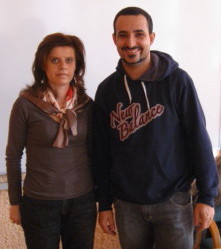 ‘I have lived in many different places, and I am able to make comparisions, based on the different points of view that I have from many different countries.’
‘I have lived in many different places, and I am able to make comparisions, based on the different points of view that I have from many different countries.’
Rodrigo Vizeu de Oliveira, Brasilian, lecturer in EMPiK School, 3 years in Poland
 During ‘Career Days’ organized by AIESEC Rodrigo Vizeu de Oliveira delivered a wonderful lecture on career path emphasizing on how important is proper planning it. I asked him some questions about cultural differences. It was a wonderful and very interesting talk. Rodrigo Vizeu de Oliveira was born in Brasil, but has also lived in the United States, France, Uganda, Great Britain … .
During ‘Career Days’ organized by AIESEC Rodrigo Vizeu de Oliveira delivered a wonderful lecture on career path emphasizing on how important is proper planning it. I asked him some questions about cultural differences. It was a wonderful and very interesting talk. Rodrigo Vizeu de Oliveira was born in Brasil, but has also lived in the United States, France, Uganda, Great Britain … .
Maya Kowalczyk : In your opinion, what’s the main cultural difference between the Poles and people form other nations ?
Rodrigo Vizeu de Oliveira : You could consider, let’s say, a new discover of your country. Completly new change, right, because lot of things … . I have lived in many different places, and I am able to make comparisions, based on the different points of view that I have from many different countries. The main point is, you guys, are changing every day. You don’t see it. I’ve been living here for three years now. Tons of things has changed, but you can’t see that because you are here all the time. So, you live here, you were born here, you raised here, still you think it’s not gonna be like that, it’s not gonna happen […]. That is your opinion. I mean, the Poles. So, the main difference is mentality. Mentality, and two words that, you guys, use that are, let’s say, solution for most of the problems : ‘Polska tradycja’. Everything is Polish tradition. Why do clean the windows before Eastern ? ‘Polish tradition’, Why do you throw water on people one day after Easter ? ‘Polish tradition’, Why do you eat fish fo Chrismtmas ? ‘Polish tradition’. It sounds like an answer for everthing. But why ? People are not keen on finding the answers because they become satisfied with these words ‘Polish tradition’ that satisfy your need of an answer. […] So, there is no answer. Another thing is when I ask my students : ‘What are going to do this weekend ?’ ‘Oh, I don’t know. I’m going to do this …, and I’m gonig to go there …’. Why ? ‘Why not’ ?’. Oh right, are you answering my question or are you asking about another thing. So, basically there is no answer. That is connected with mentality. So, the main difference is … . Because what is a country ? A country what peolple planned on the ground with it’s imaginary lines. So, you say : ‘This is my country. I was born inside these imaginary lines. So, I have a passport which belongs to these imaginary lines and I am obliged to pay taxes for this imaginary place’. There is a kind of consent. Okay, you have this lines here and there is a river here. So, on this side of this river is one country, and on the another side of this river is another country. You, even, tell funny stories about people who are not from your home country. People tend to say that.
Maya Kowalczyk : Well, such a situation occurs all around the world. Everywhere where people could not move from one side to another, for example in Switzerland because of the Alps, there are imaginary boundaries in their minds. That occurs because of lack or difficulties in maintaining contacts and communication.
Rodrigo Vizeu de Oliveira : Yeh. So, the main point is mentality. Mentality is that biggest difference that you see.
Maya Kowalczyk : Could you, please, name some features of this mentality ? For example, lack of directness … .
Rodrigo Vizeu de Oliveira : Let’s put it in this way … . American people, the biggest capitalistic country in the world, the strongest capitalistic economy in the planet … . You buy a new car. Your neighbour look at you and say : ‘Wow ! You’ve got a nice car’. He goes home, and […] he’s gonna wake up in the morning and he’s gonna try work harder to catch up with you because American point of view is about competition. In Poland your neighbour have a new car, people around will probalbly call the office to inform against him.
Another thing, of course, I’m talking about stereotypes. ‘How are you ?’ ‘Men, my dog died, my wife is cheating on me, my son is a drug dealer […]’, ‘Oh, my life is even worse. My dog is a drug dealer,[…], my son has no job’.
Maya Kowalczyk : Well, it’s about kind of … modesty.
Rodrigo Vizeu de Oliveira : According to one of professors of sociology whom I know, not according to me, it’s connected with communist past. According to him during communism you were not supposed to be happy […].
Maya Kowalczyk : We were suposed to be equal, either.
Rodrigo Vizeu de Oliveira : Exactly. So, if your life is better than mine, there’s something wrong. I need to call for somebody to check up what’s going wrong with you. There’s something that is not on the right truck. Aother thing … . That’s not only about Poland. That’s about all Slavonic countries that, you guys, are extremly pessimists. Of course, I know some people here that are not, but the average level is high. People say : ‘I’m not a pessimist. I’m a realist’. So, what is realism, what is life, what can you achive … . Can you achive ?’ […].
Maya Kowalczyk : Thanks for a wonderful and interesting interview. All the best for the future !!!
